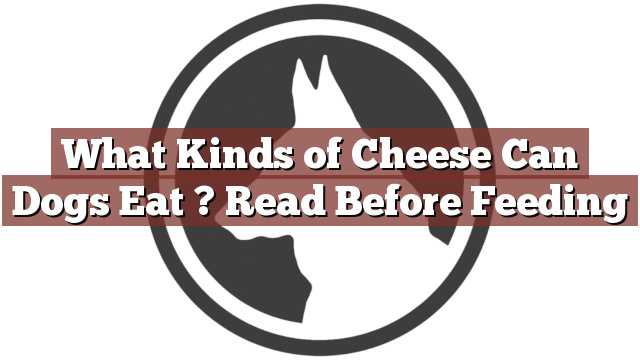Understanding Your Dog’s Dietary Needs
As a responsible pet owner, it is crucial to understand your dog’s dietary needs before introducing any new foods into their diet. While dogs are omnivores and can consume a variety of foods, not everything that is safe for humans to eat is safe for dogs. Their digestive systems and nutritional requirements differ from ours, so it’s important to choose their meals carefully.
What Kinds of Cheese Can Dogs Eat? Read Before Feeding
Can dogs eat cheese? The answer is yes, but with some important considerations. Cheese can be a tasty and nutritious treat for some dogs, but not all types of cheese are safe for them to consume. In general, dogs can safely eat cheese that is low in lactose and is not seasoned or flavored with harmful ingredients like onions or garlic.
Some examples of cheese that are generally safe for dogs include cottage cheese, mozzarella cheese, and cheddar cheese. However, it’s important to feed cheese to your dog in moderation and monitor their reaction. Some dogs may be lactose intolerant or have sensitivities to dairy products, which can lead to digestive upset or allergic reactions.
Pros and Cons of Feeding Cheese to Dogs
Feeding cheese to your dog has both pros and cons that should be taken into consideration. On the positive side, cheese can be a good source of protein and calcium for dogs. It can also be used as a high-value treat for training purposes or as a way to add variety to their diet. Additionally, the texture and taste of cheese can make it appealing to picky eaters or dogs that have lost their appetite.
However, it’s important to be aware of the potential drawbacks of feeding cheese to dogs. As mentioned earlier, some dogs may be lactose intolerant or have sensitivities to dairy products. This can cause digestive issues such as diarrhea, gas, or stomach upset. Cheese is also high in fat and calories, so excessive consumption can lead to weight gain or obesity in dogs. It’s important to remember that cheese should be given as an occasional treat and not as a regular part of their diet.
Conclusion: Moderation and Understanding Are Key
In conclusion, cheese can be a safe and enjoyable treat for dogs when given in moderation and in the right types. It’s important to consider your dog’s individual dietary needs, any potential allergies or sensitivities, and consult with your veterinarian if you have any concerns. Remember to always monitor your dog’s reaction to new foods and adjust their diet accordingly. By understanding your dog’s dietary needs and making informed choices, you can ensure that they stay healthy, happy, and well-nourished.
Thank you for taking the time to read through our exploration of [page_title]. As every dog lover knows, our furry friends have unique dietary needs and responses, often varying from one canine to another. This is why it's paramount to approach any changes in their diet with caution and knowledge.
Before introducing any new treats or making alterations to your dog's diet based on our insights, it's crucial to consult with a veterinarian about [page_title]. Their expertise ensures that the choices you make are well-suited to your particular pet's health and well-being.
Even seemingly harmless foods can sometimes lead to allergic reactions or digestive issues, which is why monitoring your dog after introducing any new food item is essential.
The content provided here on [page_title] is crafted with care, thorough research, and a genuine love for dogs. Nevertheless, it serves as a general guideline and should not be considered a substitute for professional veterinary advice.
Always prioritize the expert insights of your veterinarian, and remember that the health and happiness of your furry companion come first.
May your journey with your pet continue to be filled with joy, love, and safe culinary adventures. Happy reading, and even happier snacking for your canine friend!

